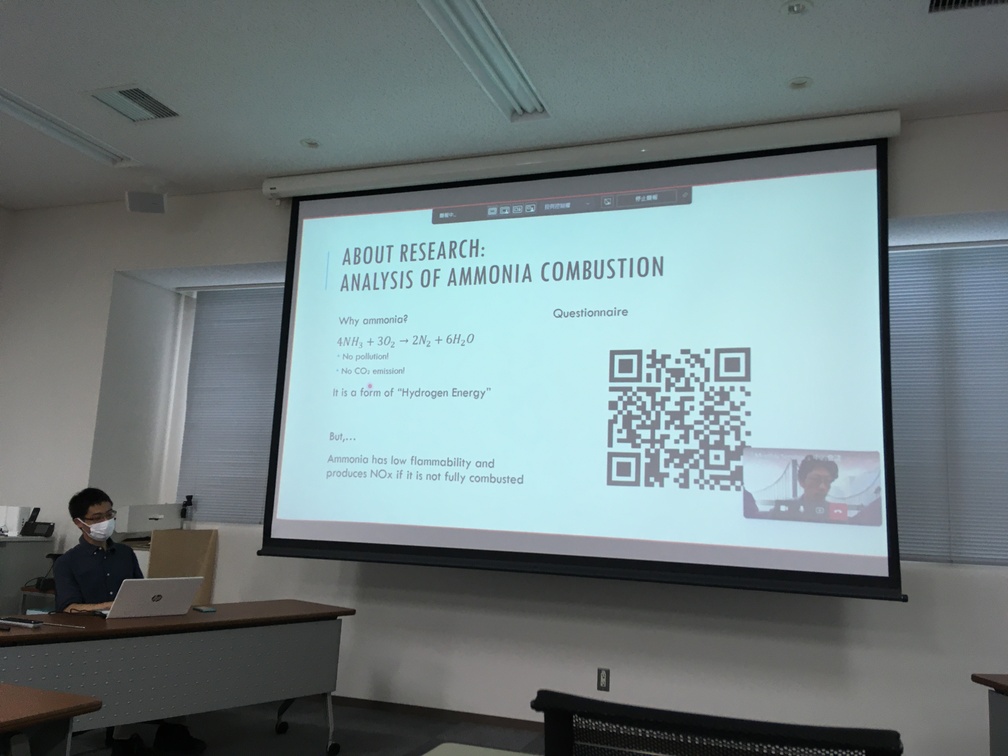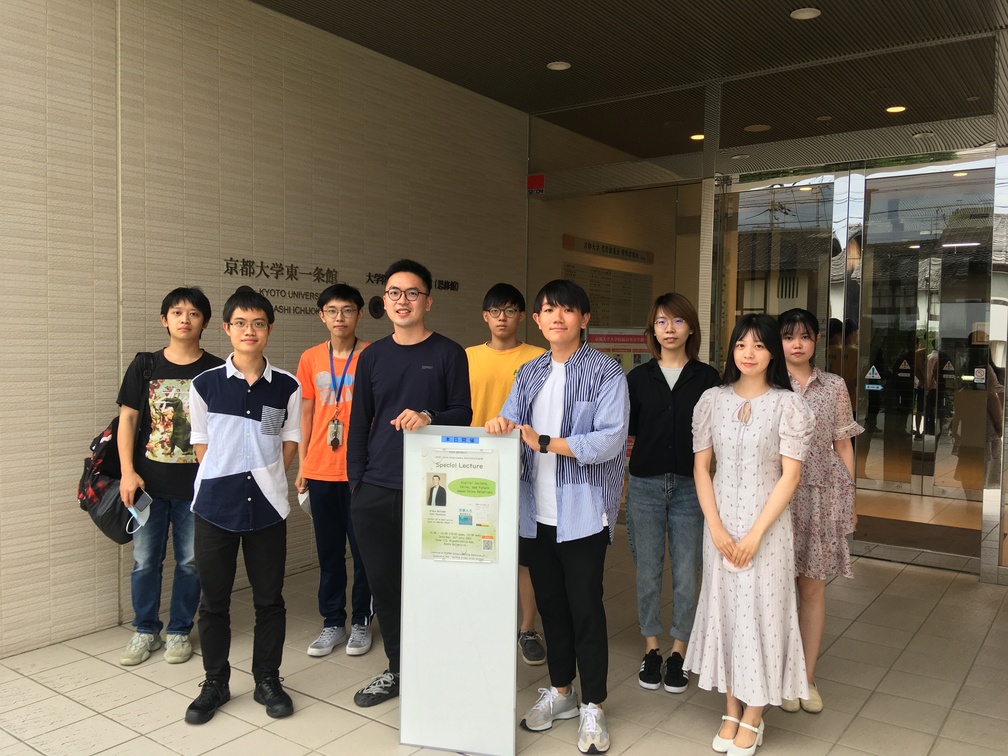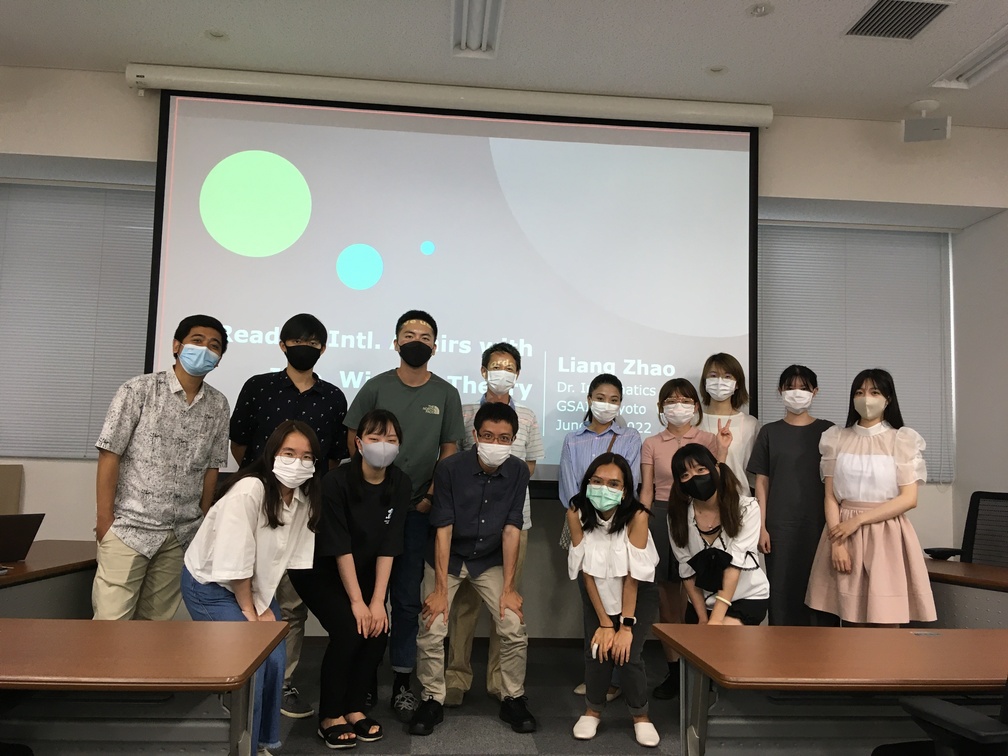Last-updated: 2024-04-10
This is a page for the general information of the AFLSP program. Please refer to Program 2024 for the detail for Academic Year 2024.
Objective
Young people should be involved in building cross-cultural relationships, developing solutions for tackling complex social issues, and creating sustainable and diverse communities. The world needs the youth to bring innovative ideas, transformative capabilities, and tremendous energy to make a difference. In particular, we want to quip sharp, young people from Asia with the necessary skills and knowledge to act responsibly to achieve greater inclusion and diversity in Asia. Therefore, based on the core principles of Kyoto University and BXAI, AFLSP@KU Enrichment Program aims to cultivate highly qualified Asian future leaders, innovators, and influencers who have the following four abilities (see an illustration).
- Do quality research (research ability),
- Analyze, articulate, and construct views and arguments from diverse perspectives (bird’s eye view),
- Have the willingness and capability to make valuable social contribution (social contribution),
- Have the critical attributes and competence of being an effective leader for the current or future environments (leadership readiness).
The program seeks to create an innovative educational platform, leveraging the advantages of intercultural communication, transdisciplinary learning, and learning-by-doing approach to develop young scholars’ understanding of the value of cross-culture and diversity and a commitment to promoting peace, regional collaboration, and harmony in Asia and beyond.
Basis 1: The core principles of Kyoto University
- (K1) to sustain and develop its historical commitment to academic freedom;
- (K2) to strive for diverse development in pure and applied research in the humanities, sciences and technology, while seeking to integrate these various perspectives in order to solve complex issues;
- (K3) to pursue harmonious coexistence within the human and ecological community on this planet.
Basis 2: The core principles of AFLSP/BXAI (Scholarship Agreement, PREAMBLE A, C)
- (A) To promote cross-cultural understanding;
- (B) To facilitate a deeper appreciation of the issues and challenges faced by Asians today.
Our program is specially designed to help scholars to achieve the above objectives. See a glance of the program in picture galance.png and overview. The detail is explained in the following (also, there is a digest version).
1. Orientation
- About BXAI
- About Kyoto University
- Program introduction
- Meet with committee members and alumni
2. Monthly Seminar
Scholars take turns presenting their research in monthly seminars in order to strengthen their communication with scholars from different domains and to reflect on their own research.
- Eight times X 2h = 16h (Usually 10am-12am, Sat)
- Duty to scholars in the 1st year
- Recommended to scholars in the 2nd year
- Each presentation consists of report for research (at least half time), culture/social activities and thinking on issues in East Asia or intl. relations.
- Others shall think together with the speaker and discuss after the presentation.
3. BXAI Summer Program (provided by BXAI)
Scholarship recipients (mainly first-year scholars) must participate in the BXAI Summer Program, which spans up to three weeks, in the first summer after their enrollment in the AFLSP. Please visit BXAI's website for more information.
4. Special Lectures and Selected Seminars
Guest speakers from the academic, industrial or public sectors will deliver selected seminars and two special lectures in order to provide scholars with learning and networking opportunities beyond their research department, to help them gain valuable insights beyond the academia, and to develop their awareness and skills by combining the advantages of academia and practical experience especially in the diversity and issues relevant to East Asia with a focus on culture and International relation.
- 6h/year X 2 years
- Special Lectures are lectures and seminars specially designed for scholars. Therefore, it is expected that all scholars join them.
- However, if you missed a Special Lecture with a strong reason, you need to take an alternative Selected Seminar.
- Sometimes the committee recommends Selected Seminars to scholars but it is free for a scholar to propose one as far as it is related to the above aim. Notice that a proposal needs the approval by the committee BEFORE joining the seminar. You may find 人文研アカデミー and 京大イベント are useful to find a candidate seminar.
5. 2-credits Lecture
Scholars must complete a 2-credits course on East Asia or international affairs provided by Kyoto University. The compulsory course is intended to enhance scholars’ understanding of economics, politics and international relations against the backdrop of contemporary globalization.
- On intl. relations (Asia-focused) or comparative studies of cross-cultural issues in East Asia (China, Japan, Korea)
- Should select one from the list provided by AFLSP@KU, or propose one and get the approval by the committee before the lecture registration.
6. Service Learning (SL)
This is a trip in Japan designed to immerse scholars in Japanese culture and lifestyle. Workshops, seminars, and local activities are organized during the trip to further understanding of Japanese culture, as well as the meaning and value of diversity and inclusion. Scholars will be given more opportunities to interact with locals through homestay with Japanese families and/or camp. Scholars are expected to analyze and provide feasible strategies to address local community concerns.
- Content: A 3-days study trip in Japan
- Mainly for 2nd year scholars but 1st year scholars are possible as well.
- Need to submit an individual research paper on East Asia or intl. relations after the trip.
- Who missed it (with a strong reason) can propose an Experience-Based Learning as alternative (requires the approval by the committee).
7. Leadership Training
Scholars participate in a workshop which incorporates leadership training tools to improve their self-awareness, as well as leadership competencies and readiness in a cross-cultural environment through group study and presentation.
- Mainly for 2nd year scholars but 1st year scholars are welcome.
8. Team-Project Based Research (T-PBR)
T-PBR is to do research in team on issues related to East Asia and/or Intl. Relations. While the ultimate goal is publication (e.g., on KUNENAI) and a Think Tank in the future, one does not need to work more than one can (to both students and professors). The most important training through T-PBR is practice of Shared Leadership, i.e., experience of leading activities with people from diverse backgrounds. The works done by senior scholars can be left to junior scholars so that the research can be continued. The roles of team members (e.g., Team leader, secretary, editor, professor, etc) can vary according to members' experience, interest, and time. Funding: Depending on the budget, each scholar will be provided an amount of funding to support the T-PBR.
9. Pre-QE & QE (Qualification Examination)
There are Pre-QE for the 1st year and QE for the 2nd year scholars.
- Winter for who enrolled in April and Summer for who enrolled in October
- All scholars are required to join the final presentation.
- Evaluation and award (one or two from ten) are based on the activities with the following criteria:
- Quality of research (evaluated by supervisor) including but not limited to understanding on existing research, importance, completeness, and creativity
- Research review (evaluated by QE board members) with the same criteria as the above
- Bird's view on issues in the world (Asia preferred) including but not limited to awareness of complex social issues, revolutionary or creative proposals
- Sociality (culture, intl. relation, communication etc) including but not limited to understanding and thinking about the diversity and issues within Asia and/or the world, contribution to the harmonious coexistence based on free ideas
- Leadership (self-leadership, group leadership, etc) including but not limited to sense of thankfulness and responsibility, abilities in challenging, execution, communication, collaboration, social networking, creativity and so on.
- Please submit your self-checked, overall competence card competence.xlsx.
(Optional but strongly recommended) Experience-Based Learning (EBL)
An additional grant will be awarded to scholars who propose a valuable fieldwork plan relating to their chosen specialization, cultural learning, or community inclusion and resilience. The EBL project aims to encourage scholars to actively engage in local communities and future professions concerning their interests. This shares the same purpose as SL, thus can be an alternative of SL. Notice that EBL is a learning activity as its name says. It can be but not need to be a research activity (unlike the T-PBR).
- Maximum funding: 50,000 Yen X 10 scholars a year (tentative, depending on the budget and #proposals)
- Submit the proposal at least one month before departure
- Can be combined with a business trip or national/oversea internship
- Need to submit a research report/paper on East Asia or intl. relations after the trip. See the following requirement.
- Application template EBL-application.docx
Requirement of the EBL and its report
- Deadline: Usually two weeks after the EBL but it is possible to extend based on application.
- Length: About 8 pages with font Times New Roman of size 11pt. If the EBL was a team-based work, then the approximate length of the report/paper is 4 page x number of members.
- Content: Since it is used as an alternative of the service learning, please try to design it similar to the Service Learning program. In particular, please include the title, aim, detailed activities, how each activity may be connected to a training of what competence, the change of competence by a self-assessment, as well as what you learned, discussions, and reflections of the EBL.
(Optional but strongly recommended) Language, Casual gathering, etc.
We strongly suggest scholars to study Japanese and/or other foreign languages. The standard language abilities for AFLSP@KU scholars are CEFR level C1 for English and CEFR level B2 for Japanese. A scholarship can apply for the fee for one language examination such as TOFEL and JPT. On the other hand, casual gatherings are organized to provide necessary program information and networking opportunities with Japanese, scholars and alumni.



